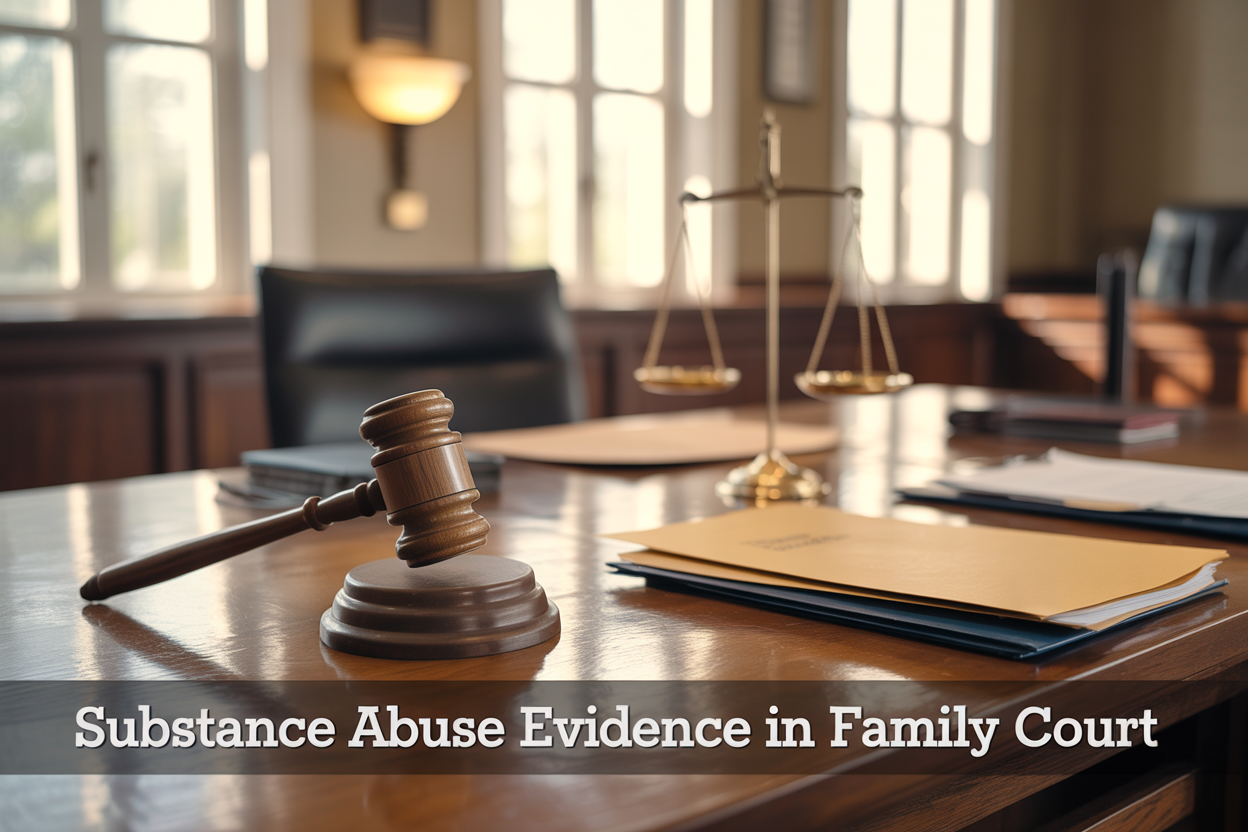When substance abuse allegations surface during divorce proceedings, they can dramatically reshape custody arrangements and parental rights. This guide is written for parents, attorneys, and anyone facing or considering substance abuse claims in family court who needs to understand how judges evaluate this sensitive evidence.
Courts don’t take substance abuse allegations in divorce cases lightly. They follow strict evidence standards and require more than just accusations to make custody decisions that protect children while respecting parental rights. The process involves multiple types of evidence, professional evaluations, and meticulous legal procedures that can be overwhelming without proper guidance.
We’ll break down the legal standards family courts use when reviewing substance abuse evidence and examine what types of proof judges actually accept in these cases. You’ll also learn about professional substance abuse custody evaluations and how expert testimony influences court decisions. Finally, we’ll cover strategies for building a solid case when making allegations and practical approaches for defending against substance abuse claims that may be false or blown out of proportion.
Understanding Legal Standards for Substance Abuse Evidence in Family Court
Burden of proof requirements for the accusing party
When someone makes substance abuse allegations in divorce proceedings, they can’t just point fingers and expect the court to take their word for it. The person bringing these allegations must provide clear, convincing evidence to support their claims. This legal responsibility falls squarely on the shoulders of the accusing party, who must demonstrate that substance abuse actually exists and poses a genuine threat to the children’s well-being.
The accusing party needs to present specific incidents, documented behaviors, and credible witnesses who can testify about the alleged substance abuse. Vague accusations or hearsay won’t cut it in family court. Judges demand concrete evidence that shows a pattern of substance abuse rather than isolated incidents that might be taken out of context.
The standard of evidence courts require for substance abuse claims
Family courts typically apply a “preponderance of the evidence” standard when evaluating substance abuse custody claims. This means the evidence must show that it’s more likely than not that substance abuse occurred. Think of it as a 51% certainty threshold – the scale needs to tip slightly in favor of the allegations being true.
This standard requires substantial proof beyond mere suspicion. Courts look for multiple forms of corroborating evidence that paint a clear picture of substance abuse patterns. Medical records, police reports, witness statements, and professional evaluations all carry significant weight in meeting this evidentiary threshold.
Distinction between criminal and civil court evidence standards
The evidence standards in family court differ dramatically from criminal proceedings. While criminal courts require proof “beyond a reasonable doubt” – essentially 99% certainty – family court evidence standards are considerably lower. This distinction means that even if criminal charges related to substance abuse were dismissed or never filed, a parent might still face consequences in custody proceedings.
Family courts focus on protecting children’s best interests rather than punishing criminal behavior. Evidence that might not support a criminal conviction can still influence custody decisions if it suggests potential harm to children. Drug testing divorce proceedings often reveal substance use that wouldn’t necessarily result in criminal charges but could impact parenting arrangements.
Legal definitions of substance abuse that impact custody decisions
Courts don’t require a clinical addiction diagnosis to find substance abuse concerning for custody purposes. Family law definitions typically encompass any pattern of alcohol or drug use that impairs judgment, creates safety risks, or interferes with effective parenting. Even prescription medication misuse can fall under these definitions if it affects parental capacity.
The legal threshold focuses on how substance use impacts parenting ability rather than meeting medical addiction criteria. A parent who drinks heavily on weekends while children are present might face custody restrictions even without a formal alcohol dependency diagnosis. Courts evaluate whether substance use creates an environment that puts children at risk, regardless of whether the parent acknowledges having a problem.
Types of Evidence Courts Accept to Prove Substance Abuse
Medical Records and Treatment Facility Documentation
Medical records serve as some of the most potent evidence in substance abuse allegations and divorce cases. These documents create a paper trail that courts find highly credible when evaluating addiction evidence in family court proceedings. Hospital admission records, emergency room visits related to overdoses or substance-related injuries, and prescription drug monitoring databases all provide concrete proof of substance abuse patterns.
Treatment facility documentation carries significant weight because it demonstrates acknowledgment of a problem and attempts at recovery. Inpatient rehabilitation records, outpatient therapy notes, and counseling session summaries paint a comprehensive picture of an individual’s substance abuse history. Courts examine discharge summaries, relapse documentation, and compliance with treatment programs to assess both the severity of addiction and commitment to recovery.
Mental health records often reveal dual diagnoses where substance abuse occurs alongside depression, anxiety, or other conditions. These medical files help establish patterns of behavior and provide context for custody decisions.
Police Reports and Arrest Records Related to Substance Use
Law enforcement documentation provides objective evidence that courts readily accept when proving substance abuse custody matters. DUI arrests, public intoxication charges, and drug possession records create an official timeline of substance-related incidents. Police reports often include detailed observations of behavior, failed sobriety tests, and witness statements that corroborate addiction patterns.
Criminal records demonstrate escalating substance abuse problems, mainly when multiple incidents occur over time. Courts examine the frequency and severity of arrests to gauge ongoing addiction issues. Even charges that were later dismissed or reduced can indicate substance abuse patterns, as prosecutors sometimes offer plea deals that don’t reflect the original offense severity.
Traffic violations linked to impaired driving, domestic violence calls involving alcohol or drugs, and public disturbance incidents all contribute to the evidentiary picture. These records are particularly damaging because they show substance abuse affecting public safety and family stability.
Witness Testimony from Family Members and Friends
Personal testimony from those closest to the accused parent can provide compelling evidence in drug testing divorce proceedings. Family members, friends, and neighbors who have witnessed erratic behavior, the smell of alcohol or drugs, or neglect of parental duties offer firsthand accounts that humanize the legal proceedings.
Courts evaluate witness credibility carefully, considering the relationship between the witness and the parties involved. Testimony from neutral parties like teachers, coaches, or family friends carries more weight than statements from immediate family members who may have bias. Witnesses might describe specific incidents where children were endangered, missed important events due to substance use, or observed physical signs of intoxication.
Documentation strengthens witness testimony significantly. Text messages, photos, or videos that corroborate verbal accounts make witness statements more persuasive. Courts look for consistency between different witnesses and corroboration from other evidence sources.
Employment Records Showing Drug-Related Incidents
Workplace documentation provides another avenue for establishing substance abuse patterns in family court evidence standards cases. Failed drug tests, disciplinary actions related to substance use, attendance problems, and termination due to addiction issues all serve as evidence. Employee assistance program participation or referrals to substance abuse counseling through work benefits can indicate problems recognized.
Performance reviews that document declining work quality, missed deadlines, or behavioral changes may suggest substance abuse issues. Workers’ compensation claims related to accidents that occurred under the influence also contribute to the evidentiary record. Professional licenses suspended or revoked due to substance abuse create official documentation of addiction’s impact on career stability.
Union grievance records, human resources complaints, and safety violation reports paint a picture of how substance abuse affects professional responsibilities and judgment.
Financial Records Indicating Substance Abuse Patterns
Financial documentation can reveal hidden substance abuse through spending patterns and money management issues. Bank statements showing frequent cash withdrawals, especially from ATMs near bars or known drug areas, suggest substance purchase patterns. Credit card statements revealing charges at liquor stores, bars, or cash advance services at unusual hours provide circumstantial evidence.
Unexplained financial losses, defaulted loans, or missed mortgage payments might indicate money diverted to substance purchases. Courts examine whether financial problems coincide with other evidence of substance abuse. Bankruptcy filings or debt collection actions can show the economic impact of addiction on family stability.
Asset liquidation patterns, such as selling valuable items or borrowing against retirement accounts, may demonstrate the financial desperation often associated with severe substance abuse. These records become particularly relevant when they coincide with custody disputes or child support obligations.
Professional Assessments and Their Weight in Court Proceedings
Court-ordered psychological evaluations and their impact
When substance abuse allegations surface in custody battles, courts routinely order comprehensive psychological evaluations to get an objective assessment of each parent’s mental health and addiction issues. These evaluations carry significant weight because they’re conducted by licensed mental health professionals who remain neutral in the proceedings.
A typical court-ordered evaluation involves extensive interviews, psychological testing, and often includes substance abuse screening tools like the SASSI-4 or AUDIT. The evaluator examines patterns of behavior, assesses the severity of any addiction, and determines how substance use impacts parenting abilities. Courts value these assessments because they provide standardized, clinical insights that go beyond accusations and counter-accusations.
The evaluation process typically takes several weeks and costs between $3,000 and $8,000, which the parties usually split. Evaluators review medical records, interview family members, and may request hair follicle or urine tests. Their final reports include specific recommendations about custody arrangements, supervised visitation, and treatment requirements.
These evaluations can make or break a custody case. When an evaluator finds evidence of ongoing substance abuse that compromises parenting, courts often restrict custody or require completion of treatment programs before unsupervised visits resume.
Substance abuse counselor reports and recommendations.
Licensed substance abuse counselors play a crucial role in family court proceedings by providing expert testimony about addiction patterns, treatment progress, and relapse risks. Their reports carry substantial credibility because they’re based on direct clinical observation and established treatment protocols.
Counselors who have worked with a parent can testify about their client’s commitment to recovery, attendance at sessions, and honest participation in treatment. They assess whether someone has genuinely embraced sobriety or is merely going through the motions to satisfy court requirements. This distinction matters enormously in custody decisions.
Courts particularly value counselor recommendations about appropriate custody arrangements for parents in various stages of recovery. A counselor might recommend supervised visits for someone in early recovery or support overnight custody for a parent who has maintained stable sobriety for an extended period.
The counselor’s assessment of relapse risk becomes critical evidence. They consider factors like stress triggers, support systems, and the parents’ coping mechanisms. Their professional opinion about whether a parent can maintain sobriety while handling the stresses of parenting influences judicial decisions significantly.
Child custody evaluator findings on parental fitness
Child custody evaluators serve as the court’s eyes and ears, conducting thorough investigations into family dynamics and the capabilities of both parents. When substance abuse allegations are involved, these professionals dig deep into how addiction affects the parent-child relationship and overall family functioning.
These evaluators interview children, observe parent-child interactions, and assess the home environment for safety concerns related to substance use. They look for signs like drug paraphernalia, alcohol accessibility to minors, or behavioral changes in children that might indicate exposure to substance abuse.
Their findings often include specific observations about a parent’s behavior during visits, their ability to maintain appropriate boundaries, and whether they prioritize their children’s needs over their substance use. Evaluators document everything from missed appointments to erratic behavior patterns that might indicate ongoing addiction issues.
The evaluator’s recommendations about parenting time, supervision requirements, and necessary safeguards become central to the court’s final custody determination. Their professional assessment of the risk to the children and the parents’ capacity for rehabilitation significantly shapes custody arrangements.
Medical professional testimony regarding addiction severity
Medical professionals, including addiction specialists and physicians, provide crucial expert testimony about the clinical aspects of substance abuse and its impact on parenting capacity. Their testimony helps courts understand addiction as a medical condition rather than simply a moral failing.
These experts explain how specific substances affect cognitive function, decision-making abilities, and emotional regulation—all critical components of effective parenting. They can testify about withdrawal symptoms, the likelihood of relapse, and how various substances might impair judgment in emergencies involving children.
Medical professionals also interpret drug test results, explaining detection windows, false positives, and the significance of specific metabolite levels. Their expertise helps courts distinguish between occasional use and chronic addiction, which dramatically affects custody decisions.
When parents are in treatment, medical professionals can testify about their progress, medication compliance, and overall prognosis for sustained recovery. This testimony often influences whether courts are willing to modify custody arrangements as parents demonstrate improvement in their condition.
Building a Strong Case When Making Substance Abuse Allegations
Documenting Patterns of Behavior Over Time
Courts don’t base custody decisions on single incidents. They want to see consistent patterns that demonstrate ongoing substance abuse issues. Start creating a detailed timeline that captures specific dates, times, and behaviors you’ve witnessed. Include everything from missed pickup times to erratic behavior during exchanges.
Your documentation should paint a clear picture of how substance abuse affects your ex-spouse’s daily functioning and parenting abilities. Note when they appear under the influence during parenting time, miss important events like school plays or doctor appointments, or show up intoxicated to family gatherings. Keep records of any emergencies where their substance use puts your children at risk.
Photos can be robust evidence, especially when they show your ex-spouse visibly impaired or surrounded by drug paraphernalia. Screenshot social media posts that reference drinking, partying, or drug use. Save text messages where they admit to being “too messed up” to take the kids or make concerning statements about their substance use.
Track the impact on your children, too. Document changes in their behavior after spending time with the other parent. Note if they come home upset, mention finding “medicine bottles” or “funny cigarettes,” or express fears about their parents’ behavior.
Gathering Corroborating Evidence From Multiple Sources
Strong substance abuse allegations in divorce cases require evidence from various sources that tell the same story. Single-source evidence rarely convinces family court judges, who need to see corroboration before making life-changing custody decisions.
Identify witnesses who’ve observed your ex-spouse’s substance abuse firsthand. These might include family members, friends, neighbors, teachers, or daycare providers. Each witness should be able to testify about specific incidents they personally witnessed, not just hearsay or general impressions.
Medical records can provide crucial evidence, especially emergency room visits related to overdoses, accidents while intoxicated, or treatment for substance abuse disorders. Request records from hospitals, rehabilitation centers, and mental health providers with proper legal authorization.
Employment records often reveal patterns consistent with substance abuse. Frequent absences, terminations for cause, or disciplinary actions related to workplace intoxication can strengthen your case. Contact HR departments or former supervisors who might testify about job performance issues linked to substance use.
Police reports create official documentation that courts take seriously. DUI arrests, domestic violence incidents involving alcohol or drugs, or welfare checks at your ex-spouse’s home all provide objective evidence of substance abuse problems.
Financial records can expose hidden addiction issues. Look for unusual spending patterns, frequent ATM withdrawals near known drug areas, or payments to rehabilitation facilities. Credit card statements might reveal purchases at liquor stores or bars during times when your ex-spouse claimed to be sober.
Working With Attorneys to Present Compelling Arguments
Proving substance abuse custody cases requires more than just gathering evidence – you need skilled legal representation to present that evidence effectively. Family law attorneys experienced in addiction evidence family court proceedings understand how judges evaluate these sensitive cases.
Your attorney will help organize your evidence chronologically and thematically, creating a compelling narrative that shows escalating substance abuse problems. They know which types of evidence carry the most weight and how to present documentation in ways that maximize impact.
Experienced attorneys understand the difference between admissible evidence and information that courts will reject. They’ll help you avoid common mistakes like presenting hearsay testimony or evidence obtained through illegal means. Your lawyer will also prepare witnesses for testimony, ensuring they understand what questions to expect and how to present their observations clearly.
Strategic presentation matters tremendously in substance abuse allegations and divorce proceedings. Your attorney will time the introduction of evidence for maximum impact, often saving the most damaging information for key moments in the case. They’ll also anticipate the opposing side’s arguments and prepare counter-evidence that addresses potential defenses.
Legal professionals can coordinate with expert witnesses, including addiction specialists who can explain how substance abuse affects parenting capacity. They’ll also work with custody evaluators to ensure your evidence is considered adequately during professional assessments.
Understanding Timing and Strategic Considerations for Filing
Timing plays a critical role in substance abuse custody evaluation success. Filing allegations too early, before you’ve gathered sufficient evidence, can backfire spectacularly. Courts may view premature filings as harassment or bad-faith attempts to gain custody advantages.
Wait until you have documented patterns spanning several months rather than rushing to court after single incidents. This patience enables you to compile comprehensive evidence that demonstrates ongoing issues rather than isolated mistakes. Emergencies are exceptions – if your children face immediate danger, file protective motions immediately.
Consider your ex-spouse’s treatment history when timing your filing. If they’ve recently completed rehabilitation, courts might be more sympathetic to their recovery efforts. Conversely, filing during active addiction periods when evidence is most apparent can strengthen your position.
School schedules and holiday periods also impact case timing. Avoid filing right before summer breaks when courts have limited availability for urgent hearings. Plan your filing strategy around times when you can quickly present evidence and witnesses.
Strategic timing also involves coordinating with other legal proceedings. If your ex-spouse faces criminal charges related to substance abuse, time your custody filing to coincide with those proceedings. Criminal convictions provide robust evidence in family court cases.
Consider the financial implications of timing as well. Custody battles involving substance abuse allegations often require expert witnesses, private investigators, and extended litigation. Plan your filing when you can sustain the financial commitment necessary for a thorough presentation of evidence.
Defending Against False or Exaggerated Substance Abuse Claims
Strategies for disproving unfounded allegations
When facing false or exaggerated substance abuse claims in family court, your defense strategy should focus on systematic evidence gathering and methodical refutation. Start by documenting your daily routine, work attendance, and parenting responsibilities through calendars, employment records, and witness statements. These records create a timeline that contradicts allegations of impairment during specific periods.
Request independent drug testing through court-approved facilities rather than relying on tests administered by your ex-spouse or their representatives. Hair follicle tests can provide a 90-day history of substance use, while regular urine screenings demonstrate ongoing sobriety. Professional evaluation by a certified substance abuse counselor can also provide an objective assessment of your relationship with alcohol or drugs.
Gather character witnesses who can testify to your behavior and parenting abilities. Daycare providers, teachers, coaches, family members, and close friends can provide powerful testimony about your interactions with your children and overall conduct. Their observations carry significant weight, especially when multiple witnesses provide consistent accounts.
Presenting evidence of sobriety and rehabilitation efforts
Courts respond favorably to proactive steps toward sobriety and personal improvement. If you have a history of substance use, present comprehensive documentation of your recovery journey. Treatment completion certificates, attendance records at support group meetings, and testimonials from counselors demonstrate commitment to change.
Medical records from physicians, therapists, or addiction specialists can verify your participation in treatment programs and current health status. Random drug screening results from employers or voluntary testing programs show ongoing sobriety maintenance. Some parents choose to install alcohol monitoring devices or submit to regular testing to demonstrate their dedication to remaining substance-free.
Professional evaluations from licensed substance abuse counselors provide expert opinions about your current risk level and recovery progress. These assessments often include recommendations for continued support or monitoring, which courts view as evidence of responsible self-awareness.
Challenging the credibility of opposing witnesses
Examine the motivation and credibility of witnesses making substance abuse allegations. Look for inconsistencies in their statements, timing discrepancies, or evidence of bias. Cross-examination should reveal whether witnesses have personal grudges, financial interests, or limited firsthand knowledge of the alleged incidents.
Investigate the background of opposing witnesses for their own substance abuse history, mental health issues, or criminal records that might affect their reliability. Past false allegations in other legal proceedings can significantly damage a witness’s credibility.
Question the circumstances surrounding alleged observations. Were witnesses in positions to observe the claimed behavior accurately? Did they have proper lighting, clear sight lines, and adequate time to form reliable conclusions? Challenge technical claims about impairment symptoms that require medical expertise from lay witnesses.
Demonstrating fitness as a parent despite past struggles
Recovery from substance abuse doesn’t disqualify someone from being an excellent parent. Present evidence of your current parenting capabilities through school records showing your children’s academic and emotional well-being. Teacher conferences, medical appointments you’ve attended, and extracurricular activities you support demonstrate active involvement.
Document your living situation, including safe housing, adequate resources, and appropriate supervision arrangements. Photos of your home, evidence of regular income, and references from neighbors or landlords support claims of stability.
Show how past struggles have made you a more attentive, empathetic parent. Letters from counselors or support group sponsors can testify to your personal growth and commitment to your children’s welfare. Many courts recognize that parents who have overcome addiction often become more dedicated to their children’s needs and more aware of potential risks.
Present detailed parenting plans that address any legitimate concerns while maximizing your time with your children. Voluntary agreements to continue testing, attend counseling, or participate in supervised visits during transition periods demonstrate reasonable faith efforts to prioritize your children’s best interests.
How Courts Balance Substance Abuse Evidence with Parental Rights
Factors Courts Consider When Substance Abuse Is Proven
When substance abuse allegations result in divorce proceedings, family courts weigh several critical factors before making custody decisions. The severity and frequency of substance use play a significant role – occasional marijuana use receives different treatment than chronic alcohol dependency or hard drug addiction. Courts examine whether the substance abuse directly impacts parenting ability, looking at instances where children were endangered, neglected, or exposed to dangerous situations.
The parents’ acknowledgment of the problem and willingness to seek help significantly influences judicial decisions. A parent who denies obvious substance abuse issues faces harsher restrictions than one who actively pursues treatment. Courts also consider the stability of the home environment, availability of support systems, and the presence of other caregivers who can provide supervision.
Recent versus historical substance abuse carries different weight in custody evaluations. A parent with five years of documented sobriety and ongoing recovery support presents a stronger case than someone with recent relapses. The court reviews employment stability, housing conditions, and overall lifestyle changes that demonstrate commitment to recovery.
Supervised Visitation and Conditional Custody Arrangements
Courts frequently implement supervised visitation arrangements when parental rights substance abuse concerns exist, but termination isn’t warranted. Professional supervision through court-appointed monitors ensures the safety of children while maintaining healthy parent-child relationships. These arrangements can range from highly structured visits at supervised facilities to less restrictive supervision by approved family members.
Conditional custody arrangements allow parents to maintain some custody rights while meeting specific requirements. Courts may order random drug testing, mandatory counseling attendance, or completion of addiction treatment programs. Some arrangements include graduated steps where successful compliance leads to increased visitation time or reduced supervision requirements.
Geographic restrictions often accompany these arrangements, preventing parents from taking children to certain locations or requiring visits to occur within specific boundaries. Transportation arrangements may require third-party drivers or public transportation to eliminate risks associated with impaired driving.
Treatment Requirements and Monitoring Protocols
Family courts typically mandate comprehensive treatment programs tailored to the specific substance abuse issue. Alcohol-related cases might require AA attendance, while drug addiction cases could involve residential treatment programs or intensive outpatient therapy. Courts often specify minimum program durations and require progress reports from treatment providers.
Random drug testing becomes a standard monitoring tool, with frequency determined by abuse severity and compliance history. Testing protocols vary from weekly screenings for severe cases to monthly checks for parents showing consistent progress. Hair follicle, urine, and blood tests each serve different purposes in monitoring recent use versus long-term patterns.
Ongoing therapy requirements extend beyond initial treatment completion. Courts mandate individual counseling, family therapy sessions, and sometimes group therapy participation. These requirements help address underlying issues that contribute to substance abuse while building healthier coping mechanisms.
Long-term Implications for Custody Modification Requests
Substance abuse findings create lasting impacts on future custody battles, drug allegations, and modification requests. Parents seeking increased custody must demonstrate sustained sobriety, typically measured in years rather than months. Courts require extensive documentation, including treatment completion certificates, sponsor statements, and employer references.
Successful modification requests depend heavily on evidence of changed circumstances. This includes stable housing, steady employment, active participation in a recovery program, and strong support networks. Courts look for fundamental lifestyle changes rather than temporary improvements.
The burden of proof shifts significantly after substance abuse findings. Parents must present overwhelming evidence of rehabilitation and sustained recovery to regain full custody rights. Even successful modifications often include ongoing monitoring requirements and immediate review triggers if substance abuse concerns resurface.
Previous substance abuse allegations and divorce records remain accessible during future proceedings, requiring parents to address historical issues while demonstrating current fitness. This creates additional challenges for parents seeking custody modifications, as they must overcome both past findings and present compelling evidence of lasting change.
When substance abuse enters a divorce case, family courts walk a careful line between protecting children and preserving parental rights. The evidence you present must meet strict legal standards, whether that’s documentation from treatment programs, professional evaluations, or witness testimony. Courts don’t take these allegations lightly and require solid proof rather than suspicions or hearsay.
If you’re facing substance abuse claims in your divorce, having the right legal strategy makes all the difference. Work with an experienced family law attorney who can help you gather compelling evidence or mount a strong defense against false accusations. Remember that courts always prioritize the best interests of children, so focus on presenting clear, credible evidence that supports your case while demonstrating your commitment to being a responsible parent.
Lass Law provides compassionate and strategic representation for families facing difficult transitions. Our Divorce & Family Law Attorneys in North County San Diego bring experience and clarity to every case. Whether you’re working with a Family Law Attorney in Carlsbad, addressing issues under Divorce Law, or seeking trusted support from a Family Law Attorney in Escondido, our team is here for you. Explore our complete Family Law services for guidance you can rely on.






